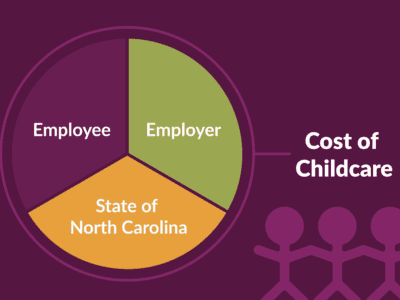
Child care has risen as a top issue for the 2025 long legislative session. Here are the EdNC pieces you need to understand the issue, its importance, and how other states are addressing the system’s shortcomings.
Child care matters because learning matters. In early childhood, care and learning are inseparable.
Brain science tells us the architecture of the brain is built in the first 1,000 days of life, deeply affecting children’s health and well-being into adulthood. Research says the most important factor in that period is secure attachments between babies and the trusted and caring adults in their lives. Here’s how babies’ brains develop:
EdNC’s early childhood team has spoken to many experts about why formal early learning environments are unaffordable and inaccessible to many. They told us that child care is a public good being treated as a private one:
At EdNC, we know words matter. And lots of words are used to describe early care and learning. The most common thing we hear from early childhood educators is, “This isn’t babysitting.” Some in the field are moving away from terms like “day care,” and even “child care,” to emphasize the educational foundation that children are receiving in early childhood settings:
We knew North Carolina was once seen as a leader in early childhood policy and investment. But we were noticing other states are now carrying that torch. So in 2023, we traveled to five of those states to study their approaches: Vermont, New Mexico, Michigan, Massachusetts, and Oregon.
We found four effective strategies those states used to move toward making early care and education a public good: advocacy from the business community, grassroots organizing, streamlining governance, and identifying/creating new funding streams:
During the 2024 election year, our audience wanted to know what recent progress looked like in states that were politically similar to North Carolina. We studied the landscape to find recent wins, and asked leaders from Florida, Alabama, Louisiana, Kentucky, and Ohio what North Carolina could learn.
We found seven policies with cross-partisan support that could be a good fit for the state’s landscape:
Experts in all 10 of the states talked about North Carolina’s early childhood leadership at the turn of the century, from its Smart Start network and high-quality NC Pre-K program to its research engines and community college system.
Yet we’re facing large challenges, as pandemic-era funding sunsets in March, the state continues to lose programs, and Western North Carolina recovers from Hurricane Helene:
So what’s next?
As the General Assembly gets rolling, the early childhood legislative caucus is asking two big questions: Where should the funding needed to support child care come from, and how should it be spent?
Here are the key funding and policy ideas at play:
Follow along as we cover the session, local efforts across the state, and the biggest issues affecting young children. Sign up for Early Bird below:





